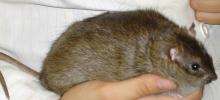October 21, 2010 report
Obese father rats have unhealthy daughters

(PhysOrg.com) -- A new study in rats has found the female pups of obese males may be more likely to develop symptoms of diabetes later in life. The condition is not a case of genetic inheritance, but appears to be epigenetic inheritance, in which the chemical markers that affect how genes are expressed are inherited by the offspring. The expression of genes can be altered by conditions created by lifestyle choices such as bad diet leading to obesity.
The research, carried out at the school of medicine in the University of New South Wales in Sydney, Australia, fed groups of genetically identical male rats either a normal diet or one overloaded with fat and 40 percent more calories, starting before the age of four weeks. The latter group became obese and developed insulin resistance and problems metabolizing glucose, which are both symptoms of type 2 diabetes. The rats were then mated with females of normal weight and their offspring were studied.
The results of the experiment were that female offspring of the obese males also developed problems regulating glucose levels by the age of six weeks, and had impaired insulin secretion by the age of 12 weeks, while daughters of the normal weight males were healthy. They also found that the islets in the pancreas, the site of insulin production, were smaller in the female pups of obese males than those of normal weight males.
The research also found an altered expression of 642 pancreatic islet genes in the daughters of obese males, even though the DNA itself was unchanged. The most significant difference was in the gene Il13ra2. Gene expression can be ‘silenced’ by the addition of methyl groups to the DNA (a process known as methylation), and the researchers found the level of methylation of Il13ra2 was only 25 percent of that found in the normal female offspring.
Obesity and diabetes researcher Margaret Morris, lead author of the paper published in Nature, said the research was one of the first findings in mammals in which a nutritional effect has been shown to be passed on from father to offspring. The condition is passed on without changes to the sperm DNA code, and the inheritance appears to be epigenetic, a process in which genes are chemically altered (such as by methylation), which changes how they are expressed in the offspring.
There has been a great deal of research demonstrating that offspring of obese mothers are more likely to become obese, but very little research has investigate possible effects of obese fathers.
Results for male offspring are not yet available because early findings suggested the effect was more pronounced in female pups, so the researchers concentrated on females. Morris plans to repeat the experiment to see if the same effect passes over multiple generations. The findings in rats may not be found in humans, and Morris said the results should be treated with some caution because it is a rat study, but she said the results do “tell us something about the sorts of consequences we might be facing if the obesity epidemic continues.”
More information: Sheau-Fang Ng et al., Chronic high-fat diet in fathers programs β-cell dysfunction in female rat offspring, Nature 467, 963-966 (21 October 2010) doi:10.1038/nature09491
© 2010 PhysOrg.com














